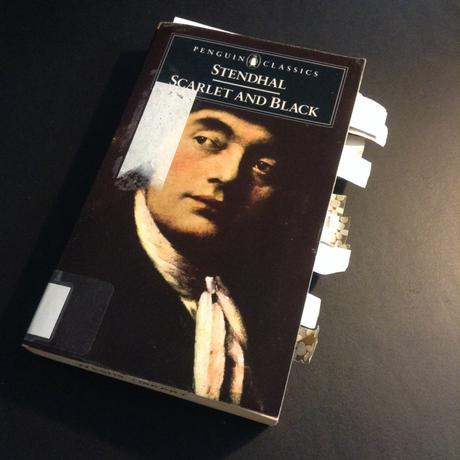
"Julien will be a notable worker in our Lord's vineyard. He is not lacking in memory or intelligence and he is thoughtful. But will his vocation last? Is he sincere?"
I have been living in 19th century Paris for the past week, viewing it through the eyes of Julien Sorel who is Stendhal's hero in Scarlet and Black. I have been held captive by his actions every minute of our acquaintance.
Julien begins his life as many things: a peasant, a carpenter's son, a Latin scholar, the lover of the Mayor's wife (Madame de Rhenal) at age twenty. But, when he goes to seminary, and then eventually on to become secretary for the Marquis de la Mole, Julien becomes a Parisian dandy.
Not that he can compete with the rich young gentlemen of the day, who bore the Marquis' daughter, Mathilde, to death. No, Julien adheres to liberal views which he is not shy about sharing; he is also aware of the hypocrisy he exhibits in not having enough independent wealth for even his daily bread.
In fact, he feels that all priests are hypocritical, and it isn't until the final chapters of the novel that Julien believes in God himself. He has been far too preoccupied with love affairs, social status, and the glory he has found in living as the nobility do.
Who can say how deep was his love for Madame de Renal? Surely at the time they felt their love to be true, but it could not be sustained with her a married woman. Probably it was inevitable that he fall in love with the Marquis' daughter at his next place of employment. But, you can see how that love could be called into question as well, once her father sees Julien's penniless status as compared to the Marquis' power and riches. All of which Julien could inherit upon marrying Mathilde.
Stendhal makes us look at status and ambition, while examining the priests and nobility, in this novel which often struck me as overly dramatic. Yet, I can forgive a novel written in 1830 for making me want to cry out, "You vile brutes!" after certain passages. The story is what makes it compelling, as I alternatively cheered for Julien and longed to slap him for his stupidity. What has changed between people of his era and people of today?
As I read, I marked quotes from Stendhal that seemed particularly insightful. Many of them apply to French culture today as I think back on the times that I have been in Paris. Below are some of the passages I highlighted.
On priesthood: "I'm confiding this detail to you so that you will have no illusions about what awaits you in the priesthood. If you are thinking of paying court to those in authority, then your everlasting damnation is assured. You may get on in the world, but you'll have to do things which will harm the poor and needy. You'll have to flatter the sub-prefect the Mayor, and, in short, any man of importance, and make yourself the servant of his passions. This way of behaviour, which the world calls savoir-vivre, may possibly, for a layman, be not entirely incompatible with salvation. But in our calling, a man has to choose between success in this world or the next - there is no middle way."
On being a freethinker: "In their eyes he was convicted of the heinous vice of thinking for himself and of forming his own judgements instead of blindly following authority and example."
On attitude: "Have you forgotten Horace's nil mirari (never show enthusiasm)? Just consider how all this tribe of lackeys, seeing you standing here, will make fun of you; they'll see in you one of their equals unjustly placed above them. Under cover of good-nature, of giving you sage advice and guiding you in the right direction, they'll be trying to trip you into making some gross blunder."
On speaking: "By the way, don't let these Parisians hear the sound of your voice. If you say a word they'll find out a way of making you look ridiculous. It's a special knack of theirs."
On entertaining guests: "The Marquis was absolutely correct in his behaviour to his wife; he took care to see that her drawing-room was adequately furnished with guests - not with peers, for he found his new made associates insufficiently noble to be entertained at his house as friends, and not amusing enough to be received in an inferior footing.
On attire: "Young Parisian women are not very fond of people of a certain age, especially when they do not dress very smartly."
On facial expressions: "A melancholy air can never be good form; what you want is to look bored. If you're melancholy, it means you want something you haven't got, or there's something in which you haven't succeeded. That's an admission of inferiority. On the other hand, if you're bored, it means that the person who has vainly tried to please you is your inferior. Realize, my dear fellow, what a grave mistake you're making."
On conversations: "The policy of the government in power, which forms the main topic of conversation in middle-class houses, is never touched on in the houses of people of the Marquis's rank, except at moments of great emergency...Provided you did not treat God, the clergy, the King, or anyone holding public office as a matter for jest; provided you did not speak in praise of Beranger, the newspapers of the opposite party, Voltaire, Rousseau, or anyone allowing himself any freedom of speech; provided, above all, that you never mentioned politics - then you were free to discuss anything you pleased."
On belonging: "In Paris, people are civil enough to hide their laughter, but you always remain a stranger."
(I read this book for Paris in July hosted by Tamara. It also applies to one of the books I have listed to read for The Classics Club.)
